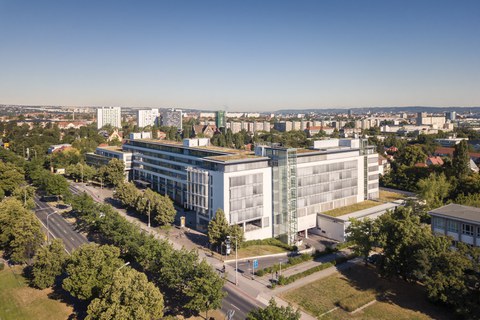Master Psychology: HPSTS
Table of contents
Short Description
People’s work lives are getting more and more complex and the success of companies and organisations increasingly depends on how this complexity is handled: Do people, procedures, structures and technologies fit and work well together? Where does a potential or a need for optimization exist? What has to change and how can change be accomplished?
The master’s degree program „Human Performance in Socio-Technical Systems“ (HPSTS) empowers people to deal with questions like these. Our graduates shall be able to navigate complex systems both competently and joyfully, understand them, and be able to develop and responsibly implement measures of improvement.
A core feature of the study program is its broad variety in terms of content. Students learn about statistics as well as personality traits, about contexts of teaching and learning as well as group dynamics, and about process management as well as human-machine-interaction.
Short Information
| Degree | Master of Science (M.Sc.) |
|---|---|
| Standard Period of Study | 4 semesters (2 years) |
| Language of Instruction | German, in parts English |
| Start | October of each year |
| Capacity | 60 students |
| Application Deadline: |
15th July of the respective year for applicants with a university degree obtained in Germany (otherwise 31st May) |
| Application | Informationen regarding appliction |
| Starting your Studies | The slides of the first semester welcome event from from the winter semester 2024/25 can be found here. |
| Fees per Semester | Semester contribution. Tuition fees for studying long term or a second degree may apply |
Admission Requirements
According to the aptitude test regulations (Eignungsfeststellungsordnung), the HPSTS Master's degree program requires a first professionally qualifying degree recognized in the Federal Republic of Germany from a degree program in psychology lasting at least six semesters or a first professionally qualifying degree from a university in one of the following subjects: ergonomics, computer science, engineering, transport sciences, economics, business education, industrial engineering, teacher training, public health, occupational health or sociology.
If you are applying with a foreign school-leaving certificate, you must provide proof of German skills at a specific level (please check here). If English is not your native language, you must also provide proof of English language skills at level B2 of the Common European Framework of Reference for Languages. The language of instruction in the degree program is predominantly German, but English is used in some courses/modules. Academic literature is also often written in English.
You must also demonstrate knowledge of the core thematic areas and the fundemental psychological subjects. Study achievements can either be recognized in the core area or in the basic area. If something is listed twice, it will only be recognized the first time.
In at least 4 of the following 12 thematic core areas, academic achievements amounting to at least 5 ECTS credits must be completed (at least 20 ECTS credits in total):
(1) Cognitive Affective Science
(2) Consumer Research
(3) Human Factors Engineering / Ergonomics / Neuroergonomics
(4) Human Resource Management
(5) Learning & Instruction (empirical educational research and instructional psychology)
(6) Marketing
(7) Organization & Work Science
(8) Public Health; Occupational Health
(9) Quality Management
(10) Social Behavior Science
(11) Statistical Methods
(12) Traffic and Transportation Science
The following are recognized as academic achievements:
- successfully completed modules
- successfully completed lectures and seminars
- Bachelor's theses, diploma theses, state examination theses in a degree program according to § 2 para. 1 no. 1. of the eligibility regulations
In at least 3 of the following 10 fundamental psychological subjects, students must provide evidence of academic achievements totaling 20 ECTS credits:
(1) General Psychology
(2) Biological Psychology
(3) Differential and Prsonality Psychology
(4) Developmental Psychology
(5) Psychological methodology
(6) Psychological diagnostics
(7) Social Psychology
(8) Statistics
(9) Traffic Psychology
(10) Engineering Psychology
The following are recognized as academic achievements:
- successfully completed modules
- successfully completed lectures and seminars
- Bachelor's theses, diploma theses, state examination theses in a degree program according to § 2 para. 1 no. 1. of the eligibility regulations
You can find detailed information on the "Your application" page
Content and Modules
The Master's degree program HPSTS is structured in modules that bundle study content on a specific topic and include various forms of study and teaching. The "Module Descriptions" page gives you an overview of which modules are mandatory for you and which can be freely chosen. Detailed descriptions provide information on typical content, learning objectives and the form of examination. However, only the information in the study regulations is binding.
Program Structure
There is a proposed course schedule for the degree program. Studying according to this schedule allows you to complete your studies within the standard period of study of four semesters. It serves as an example of which modules to take in which semester. This ideal course plan is not mandatory, but shows a sensible structure of the degree program. You can also find the study plan in the study regulations.
Internship
During the Master's degree program, you will complete a mandatory internship of at least 240 hours. The internship should preferably be completed outside TU Dresden at a practice institution, e.g. in research institutions, in profit and non-profit organizations, in political parties, associations, foundations, etc. There are many organisations in Dresden and the surrounding area that offer internships for psychologists (e.g. Infineon, Fraunhofer, BAuA). The internship can also be completed abroad. If the relevant requirements are met, internships completed before the Master's degree, a professional activity before the Master's degree or a working student job can also be recognized.
Detailed information can be found in the internship guidelines and in the FAQ.
Stays Abroad
Parts of your studies can usually also be completed abroad, either through semesters abroad or internships. General information on studying abroad can be obtained from the International Office at TU Dresden. Information specifically for students at the Faculty of Psychology (including credit transfer) can be found on the "Studying abroad" page. Are you interested in a stay abroad as part of the ERASMUS program? Our ERASMUS coordinators will be happy to advise you and support you during the application process.
Acquired Skills
This degree program teaches you central approaches, theories and findings of psychological science beyond the Bachelor's level against the background of fundamental principles, methods and potential applications. On this basis, you will be able to develop independent ideas for research questions and projects, carry them out in a methodologically appropriate manner, evaluate them and present their results in a critically reflective manner. You will also be able to apply the skills and abilities described in novel and interdisciplinary research and practical contexts, for example in the intersecting fields between human performance and cognitive-affective neuroscience as well as related fields of life sciences. In this context, you will be capable of integrating information from different content and methodological sources and of dealing adequately and (methodologically) critically with the complexity of the issues dealt with in the field of psychological science, especially when this information is incomplete or contradictory. At the same time, you will have the necessary tools to reflect responsibly on the social and ethical aspects of your actions in relation to psychological research and practice. You will be able to communicate the logic, results and conclusions derived from your work in the field of psychology appropriately and clearly and make them understandable both to people with specialist training and to laypersons. Based on the forms of teaching and learning used in the degree program, you will possess the learning skills that allow you to continue to acquire content-related and methodological knowledge in the field of psychology in a self-directed and autonomous manner.
As graduates, you will be able to master diverse and complex tasks in the field of psychology and its fields of application after an induction period in professional practice thanks to your broad psychological knowledge, your knowledge of scientific methods and your competence in abstraction and transfer.
The place of study
At the Faculty of Psychology, you will study on the main campus of TU Dresden in the Südvorstadt district. Your courses will mainly take place in the Zellescher Weg 17 office building in the immediate vicinity of the Saxon State and University Library (SLUB) and the Siedepunkt canteen. All premises are easily accessible by public transportation or bicycle.

© Crispin-Iven Mokry

© Crispin-Iven Mokry

© Crispin-Iven Mokry

© Nils Eisfeld

© Nils Eisfeld

© Crispin-Iven Mokry

© Crispin-Iven Mokry
After Your Studies
Graduating from the HPSTS Master's program opens up a wide range of future fields of activity. Typical fields of work are, for example
- in the field of business psychology as an industrial or personnel psychologist (aptitude diagnostics, personnel selection, personnel development),
- in educational psychology, for example in counselling or further education,
- in industrial research and development in human-machine system design,
- in aerospace, shipping or rail transport companies,
- in the field of human factors,
- in the spin-off of own companies,
- in research centres, at universities and universities of applied sciences in academic research and teaching.
On the "Practice fields" page, graduates of the degree program share their experiences.
FAQ
You can find answers to the most frequently asked questions about studying with us in our detailed FAQ.
Further information
As of the 2023 admission year, the HPSTS Master's degree no longer offers the possibility of obtaining a license to practice under the old model of psychotherapy training in Germany. The required clinical elective modules can no longer be offered for capacity reasons.
Orientation and study decision: Academic Advising Service
Questions about the degree program: Student Advisor
Study documents: Examination and study regulations
Recognition of achievements: Examination office
Student representation: Student Council










